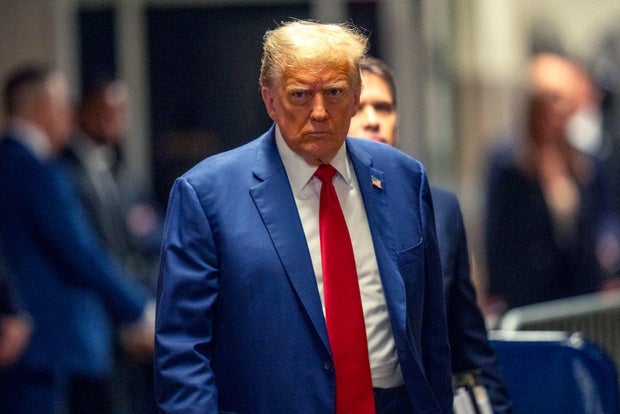The judge who supervises the former President Donald Trump’s criminal trial in New York found him in contempt of court for violating a gag order for the tenth time, warning on Monday that future infractions could result in prison time.
Judge Juan Merchan said Trump violated his order on April 22 when he commented on the political makeup of the jury.
“This jury was chosen very quickly – 95% Democrats. The majority of the area is all Democrats,” Trump said in an interview with Real America’s Voice. “It’s a very unfair situation, I can tell you that much.”
In his written orderMerchan said Trump’s comments “not only called into question the integrity and therefore the legitimacy of these proceedings, but again raised the specter of fear for the safety of the jurors and their loved ones.”
He imposed a $1,000 fine, the maximum allowed under state law. Last week, Merchan fined Trump $9,000 for nine violations in social media posts and on his campaign website. He said on Monday that the fines were not having the intended deterrent effect and that Trump could be arrested for future violations.
“Going forward, this court will have to consider a sanction of imprisonment if it is recommended,” Merchan said on the bench when the trial resumed on Monday.
He said arresting Trump was “the last thing I want to do” as it would disrupt the trial and present challenges for the Secret Service and judicial officials tasked with protecting the former president.
“The magnitude of such a decision was not lost on me,” he said. But violations of the gag order “constitute a direct attack on the rule of law – I cannot allow this to continue.”
Trump faces 34 counts of falsifying business records and has pleaded not guilty.
Trump’s gag order
Steven Hirsch/Getty Images
Merchant issued the original gag order in March, before the trial began. It barred Trump from commenting on likely witnesses, potential jurors, court staff, prosecuting attorneys and others connected to the case. The judge later expanded this order to cover his own family members after Trump attacked his daughter over her consulting work with Democratic candidates and progressive causes.
The gag order does not prevent Trump from criticizing Merchan or Alvin Bragg, the Manhattan district attorney.
Merchan found that Trump violated the order in nine of the 10 cases raised by prosecutors in previous motions last week. In Monday’s order, he evaluated four more alleged violations but found that only one violated his gag order.
The other three cases included two comments Trump made about Michael Cohen, his former lawyer and key witness in the case, and a comment about David Pecker, a former media executive who testified at the start of the trial. Trump called Cohen a “convicted liar” and said during a campaign stop that Pecker “has been very kind.”
Merchan concluded that these three cases did not constitute violations. He said the comments about Cohen could be considered “protected political speech made in response to political attacks.” Likewise, Merchan said he could not determine whether the statement about Pecker “constituted a veiled threat to Mr. Pecker or other witnesses.”
But Trump’s interview with Real America’s Voice violated the order, according to Merchan, who repeatedly warned Trump not to talk about the jurors.
“[T]your Court concludes that [prosecutors] established the elements of criminal contempt beyond a reasonable doubt. This Court’s Expanded Order is legal and unambiguous,” he wrote. “The defendant violated the Order by making public statements about the jury and how it was selected.”
Merchan also threatened Trump with prison time for future violations in last week’s contempt ruling. He reiterated that warning on Monday, but said he would not order her arrest for the latest violation as it occurred after his initial ruling.
“Because the offensive statement was made prior to this Court’s April 30 ruling and because the People are seeking only a monetary fine, the Court will, once again, fine the Defendant $1,000,” he wrote. “However, as this is now the tenth time this Court has held Defendant in criminal contempt, encompassing three separate motions, it is evident that monetary fines have not been, and will not be, sufficient to deter Defendant from violating the lawful orders of this Court.”
Trump, Merchan wrote, “is hereby advised that, if appropriate and justified, future violations of his lawful orders will be punishable by incarceration.”





















